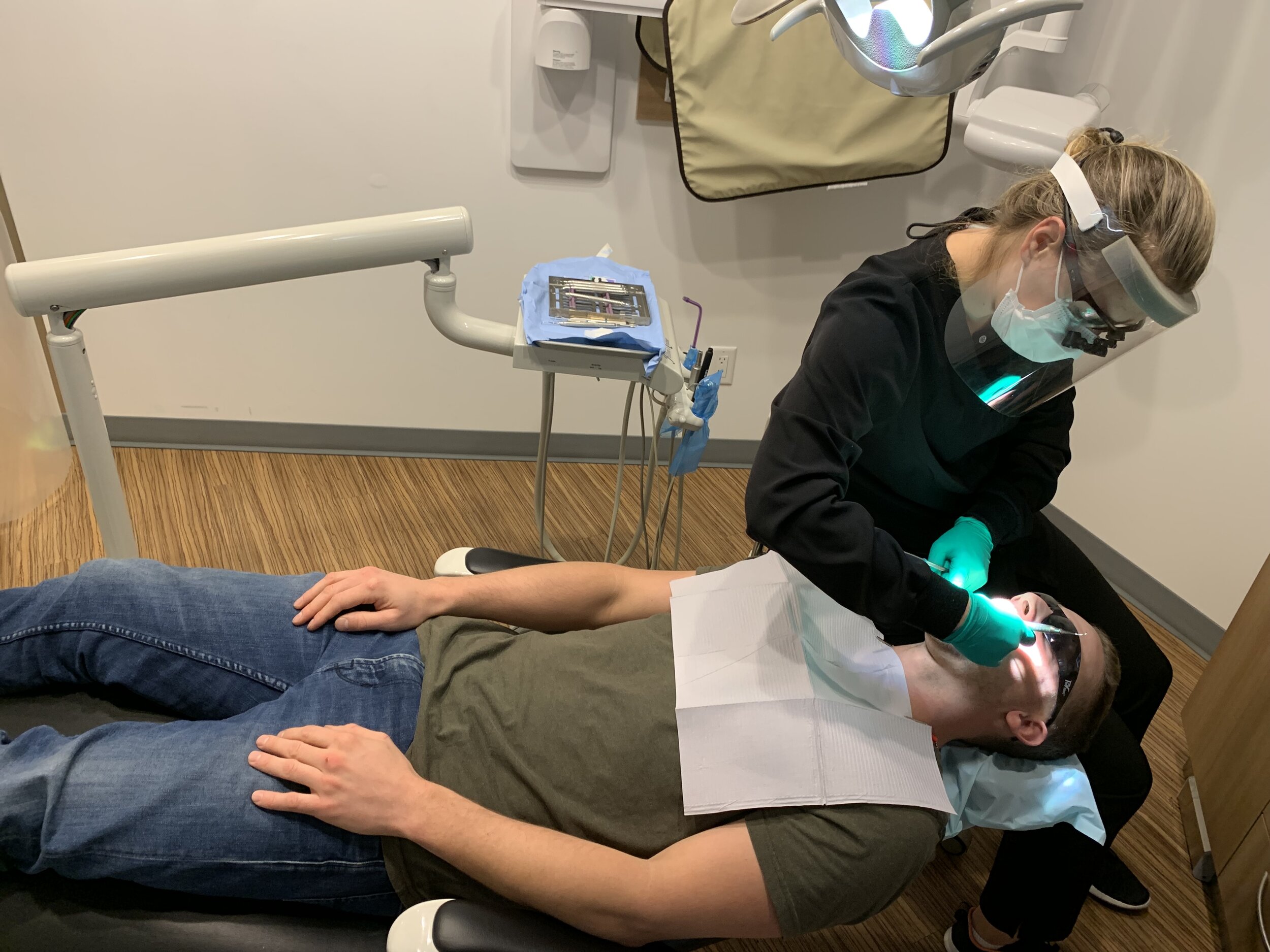We give you an up close and personal view of what a typical day looks like for one of our Dental Hygienists
What is a Dental Hygienist?
As a dental hygienist it is my job to help maintain health of the teeth and gums. I am trained and educated to specialize in the prevention and treatment of many oral diseases including gum disease. With each client I complete a thorough assessment of the current condition of the teeth and tissues in the mouth. With this information a plan is developed which involves treatment and preventive and educational services to promote and maintain good oral health.
A major aspect of my role is to remove plaque and calculus (tartar) build-up from the teeth. These deposits harbour bacteria, which can contribute to gingivitis and periodontal (gum) disease. Performing periodontal debridement, or cleaning these deposits from the teeth, improves the health of the gums. Regular cleanings aim to maintain health of the gums and prevent further progression of gum disease.
I am trained to administer local anaesthesia and perform dental x-rays. I can apply topical fluoride to prevent cavities and silver diamine fluoride to treat cavities. Although many of our duties are to treat unhealthy conditions, a large aspect of our job is to provide patient-specific oral hygiene instruction and education to focus on prevention of oral diseases.
Busy day at the clinic for our Dental Hygienists
What kind of education did you take to become a Hygienist?
I have an Associate’s Degree in Dental Hygiene, which I completed at Argosy University in Minnesota in 2007. Following completion of the program I wrote both the American and Canadian Board Exams and received my license to practice in Alberta and later Saskatchewan.
I had always pictured myself in a career in the healthcare field. Following graduation from high school I wasn’t quite sure what path to take so I began my studies in general sciences for the first 2 years. At that point I was ready to narrow my studies and I decided on the dental hygiene program.
The program I attended was 3 years in duration. The first semester consisted of general studies such as English, Math, Chemistry and Anatomy, which I had previously completed prior to the program. Therefore I was able to complete the dental hygiene program in 5 semesters. This particular program went through the summer, with 2 or 3 week breaks between each semester.
Most people gain a glimpse of the dental professions through their own experiences visiting the dental clinic. My dad is a dentist so I grew up spending quite a lot of time around the dental office and other dental professionals. When I decided on dental hygiene I already had a good understanding of what the career would be like. For anyone considering a career in the dental field I would definitely recommend discussing the profession with your dentist, hygienist or any other member of the dental staff.
If there were tips I could provide to someone interested in a career in dental hygiene I would say that the career is perfect for anyone with a desire to work closely with people. Good communication and interpersonal skills are important in helping people with their oral health. An interest in science and good study skills and focus helps while going through the program. Hand-eye coordination, fine manual dexterity and the working with your hands are quite important aspects of the profession. Someone who is detail orientated and thrives on routine would excel in this role.
Describe your typical day at the clinic?
I begin each day by looking at the schedule. I familiarize myself with each client I will be seeing by taking a look at their chart and reading any relevant notes from previous visits or information relayed to the receptionist by the patient about this visit. I then ensure my room is setup and stocked with any instruments and supplies that will be needed.
With each client I discuss any problems or concerns they are having with their teeth or mouth. We discuss the client’s medical history and ensure information such as medical conditions, medications and allergies are recorded in the client’s chart.
Some of the tools we use at the clinic
We take radiographs (x-rays) regularly to be able to examine the areas of the teeth and supporting bone, which we are not able to assess visually. With these radiographs and after visual examination of the teeth, I ensure we have an up-to-date dental record in the file consisting of previous dental work present and current conditions. Periodontal charting is recorded and updated regularly by taking measurements around the teeth to assess the level and health of the gums and tissues around the teeth. These measurements are important in evaluating the current health of the gums and to assess for presence of gum disease.
Once this assessment and evaluation portion is complete I am able to develop a plan with the patient for dental hygiene treatment needed based on the current condition and health of the teeth and gums.
Plaque and tartar build-up are relentless at forming on the teeth. It is this build-up and the bacteria associated with it that contributes to gingivitis and gum disease. Using my instruments, I remove any soft plaque and hardened tartar deposits from the teeth, both above and below the gums. Removing these accumulated deposits reduces bacteria and improves the health of the gums and aids in maintaining health of the tissues. Following completion of scaling the teeth, procedures such as polishing and fluoride treatments can be performed.
Following the cleaning portion of the client’s appointment I ensure the patient is made aware of the current health and condition of the tissues in their mouth. Throughout each appointment I aim to educate the client on their teeth and gums. Oral hygiene instruction customized to each client and their specific needs is discussed and demonstrated. Probably my favourite part of each client’s visit is providing them with a bag of oral hygiene goodies. I love picking out a toothbrush, floss, toothpaste and any other oral hygiene aids that may be useful depending on their specific needs.
As a hygienist I am concerned with maintaining health of the teeth, but as for diagnosing cavities or planning for restorative treatment in the mouth that is left to the dentist. Regular dental exams are important to treat cavities or other issues or concerns early to prevent need for larger or more complex treatments. Following the cleaning I will let the dentist know we are ready for the exam. While the dentist is performing the exam I enter the treatment required into the chart and following the exam I am able to answer any question or further explain what was discussed by the dentist.
I always ensure that at the end of each appointment I review what was done at this visit, what treatment is required for the future, and the recommended interval for future dental hygiene care. I am able to relay this information to the receptionists to help the patient book appointments needed.
Although having our teeth cleaned can improve how our teeth look and feel, the real benefit is to improving and maintaining oral health, which has strong links to one’s overall health and wellbeing.
What’s your favourite part about your job?
My favourite part of the job is working so closely with people, both the patients I see and the other members of the dental staff. I love educating patients on maintaining health of their teeth. It’s a pretty great feeling to send someone off with nice clean teeth.
Taking care of your teeth
Oral health is more important than most might realize. Studies suggest that oral bacteria and the inflammation associated with gum disease might play a role in some diseases. Furthermore, poor oral health can affect your quality of life. Taking care of your teeth helps to maintain overall physical, mental and social well-being.
“I hope this information was helpful, being a Dental Hygienist is challenging, rewarding and exciting!”
-Michelle H. RDH
If you’re interested in chatting with the team at Blairmore Dental about some of the services we offer please give our team a call on 306-931-0000. We’re accepting new patients.


